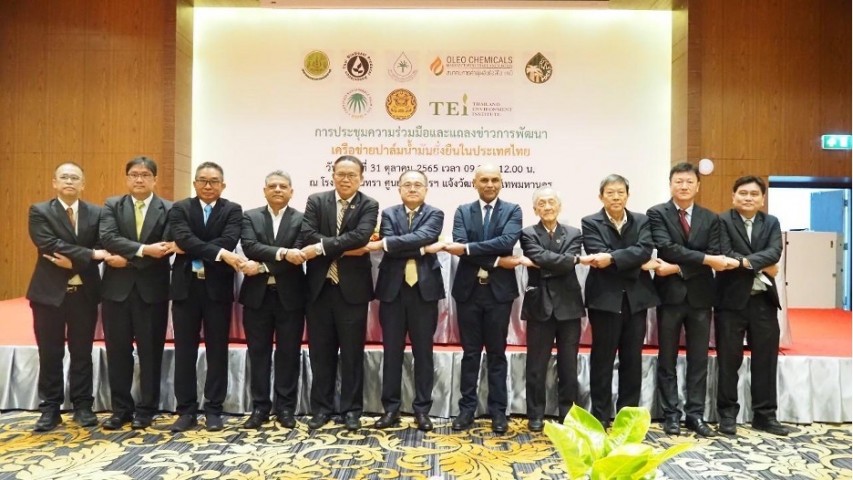
Bangkok, 31 October 2022: The Thailand Sustainable Palm Oil Alliance (TSPOA) was jointly launched by the Roundtable on Sustainable Palm Oil (RSPO) and the Thailand Environment Institute (TEI) to create a platform for shared cooperation among stakeholders in the palm oil supply chain, and promote sustainable palm oil in Thailand. Representatives from the two parties attended the launch ceremony with five other partners – National Farmers Council, Palm Oil Crushing Mills Association, Palm Oil Refinery Association, Thai Biodiesel Producer Association and Oleochemical Association.
The organisations gathered at the launch to make a joint commitment about taking step-by-step actions to promote the adoption of sustainable palm oil in Thailand’s palm oil market. Members of the media were in attendance.
Speaking at the launch, Chief Executive Officer of RSPO, Joseph D’Cruz said it is vital that sustainability standards become embedded across the entire global supply chain.
“In addition to supporting growers, especially smallholders, to adopt the RSPO Principles and Criteria from the supply side, we must boost the uptake of certified sustainable palm oil (CSPO) from the demand side, especially in the growing market of Thailand. And, we must establish RSPO certification as a default requirement in all business models, government policies, and trade deals,” he added.
He went on to mention that as a part of their RSPO membership, all RSPO members commit to the spirit of shared responsibility, which is the collective commitment to continuously increase the demand for CSPO, as well as taking steps to support the sustainability efforts of large and small growers around the world. This supports the vision of RSPO to make sustainable palm oil the norm (not just to transform sustainable palm oil production).
Echoing the sentiment was Director of the Thailand Environment Institute, Dr. Wicharn Simachaya who emphasised the importance of the collective action of the alliance.
“In the past, exports and certifications could still carry out a small number of standards. However, most of them focus on domestic consumption. The partners in this alliance will have the power to cooperate to promote and increase confidence in sustainable palm oil production. They will drive and practice together throughout the system, especially the dissemination of information and knowledge to raise awareness in the production and sustainable use of palm oil and consuming products that have been certified according to standards,” he said.
According to the objectives of the alliance, there are five areas that will drive the alliance:
- Coordinating and expanding the production and utilisation of palm oil sustainably at all levels
- Synergising corporations to develop the potential and strength of members and networks
- Promote and support the production and utilisation of palm oil that has achieved sustainable production standards
- Raise awareness for sustainable palm oil production and utilisation, and
- Promote the role of working between different sectors in leveraging policies and setting standards for sustainable palm oil production and utilisation in Thailand toward international standards
About RSPO:
The Roundtable on Sustainable Palm Oil (RSPO) was formed in 2004 with the objective of promoting the growth and use of sustainable oil palm products through credible global standards and engagement of stakeholders. RSPO is a not-for-profit, international, membership organisation that unites stakeholders from the different sectors of the palm oil industry including oil palm producers, palm oil processors or traders, consumer goods manufacturers, retailers, banks and investors, environmental or nature conservation NGOs, and social or developmental NGOs.
This multi-stakeholder representation is mirrored in the governance structure of RSPO such that seats in the Board of Governors, Steering Committees and Working Groups are fairly allocated to each sector. In this way, RSPO lives out the philosophy of the “roundtable” by giving equal rights to each stakeholder group, facilitating traditionally adversarial stakeholders in working together to reach decisions by consensus, and achieving RSPO’s shared vision of making sustainable palm oil the norm.
The seat of the association is in Zurich, Switzerland, while the secretariat is currently based in Kuala Lumpur with satellite offices in Jakarta, London, Zoetermeer, Beijing, Bogotá and New York.
Keep reading

Book Your Slot for the Additional prisma Clinic Session at RT2025

Advancing Jurisdictional Certification in Sabah: Strengthening Collaboration Between RSPO, UNDP, and Jurisdictional Approach System for Palm Oil (JASPO)
Call for Expression of Interest: Independent Investigation of a Complaint

Leading Labels: RSPO Among Top Sustainability Labels in Dutch Market

The 21st International Oil Palm Conference Successfully Took Place in Cartagena, Colombia

Top Performers of the 2025 Shared Responsibility Scorecard

ACOP 2024: RSPO Market Trends Resilient Despite Global Challenges

RSPO: Actions for the Certification of Sustainable Palm Oil Production




